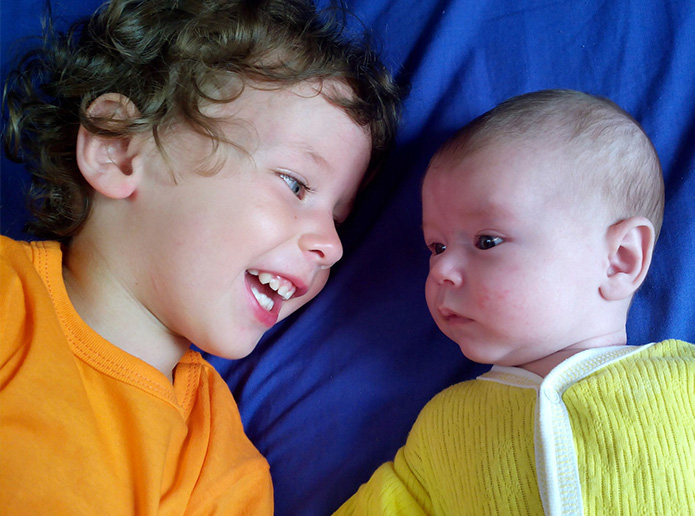Pregnancy and the arrival of a new baby can stir up many different feelings for parents and other family members. It can be especially challenging for toddlers.
Sharing the news
It is important to include your toddler in the lead up to the arrival of your new baby.
Siblings will be one of the most important relationships in your child’s life – this relationship is usually longer than the parent-child relationship – so it is important that it gets off to a good start.
The way children respond to the news of the impending arrival of a sibling will depend on their temperament, and their age and stage of development.
Preparing your toddler for the arrival
Allow children to express their feelings about the new baby by helping them put words to their emotions.
Visit friends with babies, start some role-playing with dolls, feeding and putting ‘baby’ down to sleep. Share stories and pictures of your older child when they were a baby.
Make a sibling story book so when the baby arrives they can tell the story to the baby about his big brother or sister. The sibling can possibly read to the baby too, because that is a very important job.
If you are planning to move your toddler from a cot to a bed, do this before the baby is born, so there is no resentment towards the baby. Discuss with your toddler if they are happy to give their old pram to the baby.
Are you buying a double stroller? If so, have your child sit in the stroller and then put a doll or teddy in the stroller to represent the baby. Get your toddler used to the new stroller before the baby arrives.
If it is planned that your child will go for a sleepover when the baby arrives, help them by practicing sleepovers beforehand.
Continue normal routines as they help to give toddlers a sense of security. They like to know what is coming next.
Introducing your toddler to the new baby
It is a good idea not to have the baby in your arms when your toddler arrives so you can give them a big cuddle. Make a fuss of them before introducing them to the new baby.
Take hints from your toddler, who may be shy at first. You might say, “Would you like to see baby’s little feet? You used to have such tiny feet like that. Would you like to stroke them?” Your toddler might be keen to hold the baby, but don’t push it if they are not. Take a photo of them together so your toddler can show everyone.
Make sure they know you will still love them now the baby has arrived. New babies are often showered with gifts and toddlers might feel put out. Some new books or appropriate toys as a present from the baby might help any relieve any potential resentment.
Hospital visits
If you are in hospital, visiting might be a new experience for your toddler. They may be shy or anxious seeing you in your pyjamas during the day. They may become upset if they see their mum with drips and drains attached. Consider planning the first visit after these are all removed.
Toddlers have short attention spans and hospital rooms are pretty boring, so organising an activity box with things to keep them entertained is helpful. Snacks to satisfy little appetites often go down well.
If your partner or support person is bringing your toddler late in the afternoon, you might like to do your bedtime routine in hospital. Having a shower in mum’s bathroom and then a book to read before they go, can normalise their life and makes it easier when they get home and ready for bed.
Want to know more?
Managing a toddler and a baby at home
The Raising Children Network – New baby: preparing your other children
Australian Breastfeeding Association – Preparing your toddler for the new baby




